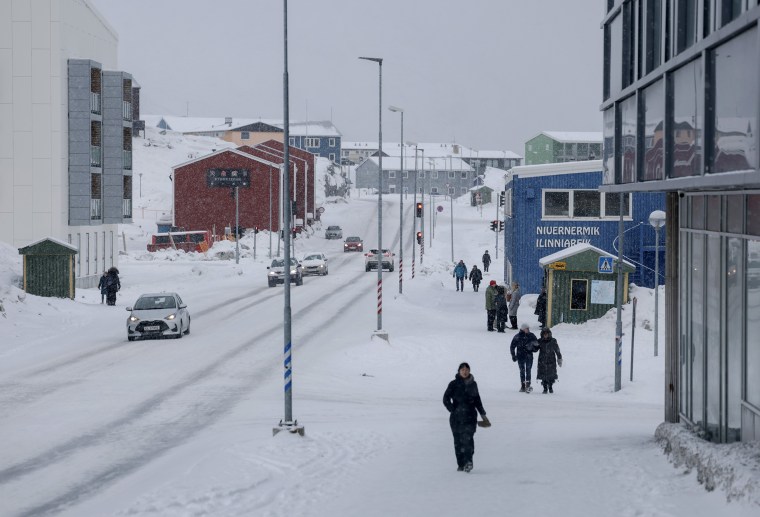Vice President JD Vance said Tuesday that he will join his wife this week as part of the U.S. delegation planning to visit Greenland, with changes also being made to a schedule that had sparked anger on the Arctic island.
On the visit, which Greenlanders have seen as provocative, Vance and second lady Usha Vance will travel to the American Pittufik space base along with national security adviser Mike Waltz and Energy Secretary Chris Wright.
“We want to reinvigorate the security of Greenland because we think it’s important to protecting the security of the entire world,” Vance said in a video posted on X.
“Leaders in America and in Denmark ignored Greenland for far too long and that's been bad for Greenland. It's also been bad for the security of the entire world. We think we can take things in a different direction so I'm gonna go check it out,” the vice president added.
The announcement of the visit to the northwest of the semi-autonomous Danish territory went some way to soothing Copenhagen's anger. The plan replaced earlier plans for a trip by the second lady to the capital, Nuuk, Greenlandic heritage sites and the territory's national dogsled race.
The original schedule had added to the confusion in Nuuk and Copenhagen about what the Trump administration wants with the self-governing territory. Apart from saying that Greenland is integral to U.S. national security and neglected by Denmark, and that he wants its minerals, the only explicit desire President Donald Trump has expressed about the island is that he wants the U.S. to own it.
The change of agenda that now keeps the Vances, Waltz and Wright far away from any major Greenlandic settlements appeared to assuage Greenlanders and Danes.

After accusing the Trump administration Monday of “a lack of respect,” Danish Foreign Minister Lars Løkke Rasmussen told a local broadcaster Wednesday that he welcomed the White House’s decision to step back from an uninvited visit to the Greenlandic people.
Denmark still controls decisions on the foreign and defense policy of the island that is home to 56,000 people.
Earlier this week, Trump doubled down on his suggestion that the U.S. should take over the sparsely populated island, saying it was important for national security.
“I think Greenland is going to be something that maybe is in our future,” Trump told reporters Monday, adding, “People from Greenland are asking us to go there.”
Calling the visit “unofficial,” outgoing Greenland Prime Minister Múte Egede said in another post on Facebook on Monday that the move by U.S. officials was “neither appropriate nor acceptable between allied and friendly nations.”
Trump's repeated comments about taking over Greenland in recent months have galvanized the political sphere of the vast island where independence has long been broadly popular.
During a tightly contested parliamentary election held earlier this month, all candidates said they did not want their island to become part of the U.S. On March 15, nearly a thousand Greenlanders marched across the capital, Nuuk, to protest against Trump’s proposed annexation.
A surprise election result saw the pro-business Demokraatit party defeat Egede’s ruling Inuit Ataqatigiit party, but it has yet to form a coalition government. In the meantime, a caretaker government is overseeing Greenland’s affairs.
During the vote earlier this month, the eventual winner, incumbent prime minister and leader of the Demokraatit party Jens-Frederik Nielsen told NBC News international partner Sky News that “we don’t want to be Americans. No, we don’t want to be Danes. We want to be Greenlanders.”

Angry Greenlanders have taken to social media to vent their anger in recent days, with one commenter on Facebook saying that the government in Nuuk should close the U.S. Embassy and another suggesting that U.S. money already has significant and hidden influence in the territory's politics.
The original plans for the official visit were perceived to be so disrespectful because Greenland still does not have a new government in place, Dwayne Ryan Menezes, the managing director of the Polar Research and Policy Initiative, told NBC News on Wednesday.
Still, the Trump administration has not completely ruined its chances of warming up the potential next leaders in Nuuk, he added.
“What approach to independence from Denmark, and any future relationship with the U.S., will win the day," Menezes said, "will ultimately depend on who Demokraatit decides to form a coalition government with.”